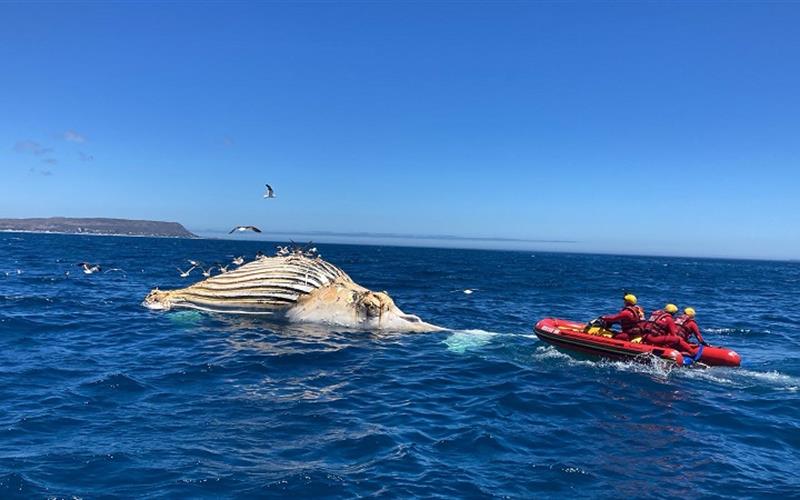A joint operation between the City of Cape Town and the National Sea Rescue Institute (NSRI) Hout Bay Station successfully removed and disposed of a 35-tonne whale carcass from Hout Bay last Sunday.
PHOTOS | Dead humpback whale transported through Constantia – VIDEO / IMAGES
The massive carcass, initially observed floating in the bay, was safely transported to Vissershok Landfill.
The operation began when the whale carcass was first spotted, early on Saturday morning floating off Kommetjie drifting towards the coast.
Due to its size and the potential risks it posed, a swift and coordinated response was required.
The City’s Coastal Management Department was immediately activated to oversee the retrieval operation.
After assessment, the decision was made to tow the carcass to the Hout Bay slipway using a specialised vessel provided by the NSRI Hout Bay Station.
The NSRI team worked alongside the City’s Coastal Management officers to ensure the safe towing of the carcass.
Once at the slipway, the City’s Urban Waste Management: Specialised Equipment Services (SES) team, Traffic Services and the Corporate Fleet Management team took over to execute the challenging task of loading the carcass for transport to landfill.
Stabilising the carcass, which was already in an advanced state of decomposition, on the flatbed truck was a very complex challenge.
It required all the teams’ ingenuity and expertise, especially as the route to landfill included a steep and bendy section over Constantia Nek.
Special recognition should also be given to:
• Marwaan Davids: Senior Superintendent: SES: Managing, coordinating and supervising the complex two-day operation to transport the carcass to landfill in an exemplary manner, ensuring risks to the public were minimised.
• Buyron Phillips: the driver of the flatbed truck, who showed remarkable skill and bravery during the operation. While drivers are competent to handle abnormal loads, this is not without risk.
Traffic Services then assisted with traffic control while the carcass was on route, ensuring civilian vehicles were kept at a safe distance.
UWM: Cleansing SES also assisted with the clean-up of the slipway, including mechanical cleaning and sweeping of the route from Hout Bay to landfill.
After reaching the landfill, the disposal team followed the protocol for trenching and it was safely disposed by the staff on site.
A trench had been dug in anticipation of the whale’s arrival, but had to be widened and lengthened significantly due to the size of the animal.
The massive creature measured 14.3 metres; too big to be weighed on the landfill weighbridge, but is estimated to weigh-in at around 35 tonnes.
‘This was a complex and challenging operation, but thanks to the excellent coordination between the City and the NSRI, we were able to ensure the safe removal of the whale carcass with minimal disruption to the local community and environment.
‘We would like to thank the NSRI Hout Bay Station for their professionalism and dedication in assisting with this operation. We also thank other supporting City departments like Law Enforcement, By-Law Enforcement and Traffic Services for their help on the day. We also thank the public and visitors/tourists for their patience during the operation and while the carcass was being transported via a flat-bed truck to landfill,’ said Mayoral Committee Member for Urban Waste Management, Alderman Grant Twigg.
